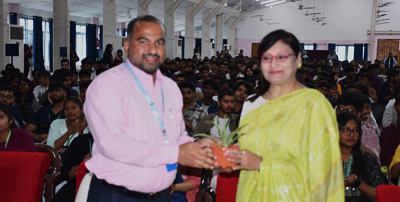In an era of information overload, media literacy is not just a skill but a necessity.
A highly insightful Media Literacy Seminar was conducted on Saturday (March 22) at St. Xavier’s College of Management and Technology, Patna, by Ms. Minati Chaklanavis on behalf of the FactShala University Network. This network is an initiative led by DataLEADS, a fact-checking and media literacy project by Internews, in collaboration with the Google News Initiative.
The seminar aimed to equip students and young professionals with critical skills to navigate the digital landscape responsibly, identify misinformation, and develop a more analytical approach towards news consumption.
Ms. Minati Chaklanavis, a well known figure in Patna with a vast experience in radio, TV and media education, engaged the audience with interactive discussions, real-world examples, and hands-on exercises, highlighting the importance of fact-checking, source verification, and the role of credible journalism in a democracy. The session emphasised the dangers of misinformation, media bias, and the need for digital resilience in today’s fast-paced information ecosystem.
Speaking about the initiative, Ms. Chaklanavis said, “In an era of information overload, media literacy is not just a skill but a necessity. This seminar is a step towards empowering individuals to critically assess the information they consume and share.”
About FactShala University Network
The FactShala University Network, supported by the Google News Initiative and implemented by DataLEADS, a project under Internews dedicated to building a network of media literacy trainers, continues to spearhead efforts in promoting media literacy across educational institutions in India. Through its innovative programmes, DataLEADS ensures that young minds are well-equipped to combat misinformation and engage with media responsibly.
The FactShala University Network is a nationwide media literacy initiative led by DataLEADS in partnership with the Google News Initiative. It aims to educate students, educators, and communities on media literacy, fact-checking, and responsible information consumption.



